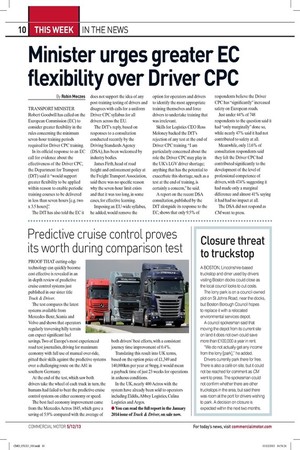Minister urges greater EC flexibility over Driver CPC
Page 6

If you've noticed an error in this article please click here to report it so we can fix it.
By Robin Meczes
TRANSPORT MINISTER Robert Goodwill has called on the European Commission (EC) to consider greater flexibility in the rules concerning the minimum seven-hour training periods required for Driver CPC training. In its official response to an EC call for evidence about the effectiveness of the Driver CPC, the Department for Transport (DfT) said it "would support greater flexibility to be applied within reason to enable periodic training courses to be delivered in less than seven hours [e.g. two x 3.5 hoursr The DfT has also told the EC it does not support the idea of any
post-training testing of drivers and disagrees with calls for a uniform Driver CPC syllabus for all drivers across the EU.
The DfT's reply, based on responses to a consultation conducted recently by the Driving Standards Agency (DSA), has been welcomed by industry bodies.
James Firth, head of road freight and enforcement policy at the Freight Transport Association, said there was no specific reason why the seven-hour limit exists and that it was too long, in some cases, for effective learning. Imposing an EU-wide syllabus, he added, would remove the option for operators and drivers
to identify the most appropriate training themselves and force drivers to undertake training that was irrelevant.
Skills for Logistics CEO Ross Moloney backed the DfT's rejection of any test at the end of Driver CPC training. "I am particularly concerned about the role the Driver CPC may play in the UK's LGV driver shortage; anything that has the potential to exacerbate this shortage, such as a test at the end of training, is certainly a concern," he said. A report on the recent DSA consultation, published by the DfT alongside its response to the EC, shows that only 9.5% of
respondents believe the Driver CPC has "significantly" increased safety on European roads. Just under 44% of 748
respondents to the question said it had "only marginally" done so, while nearly 47% said it had not contributed to safety at all. Meanwhile, only 11.6% of consultation respondents said they felt the Driver CPC had contributed significantly to the development of the level of professional competence of drivers, with 47.4% suggesting it had made only a marginal difference and almost 41% saying it had had no impact at all.
The DSA did not respond as CM went to press.




































